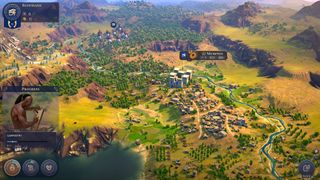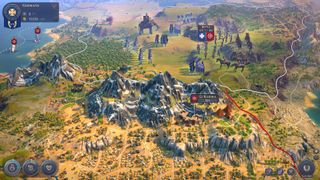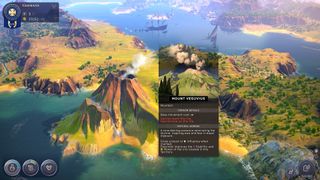Humankind rewrites the rules of Civilization
And embraces multiculturalism.

Every great city began as a hamlet, and so it was with Amplitude. Starting out as an independent purveyor of space strategy in 2011, the studio always had its eyes on a frontier closer to home: the history of Earth. Now, with the backing of Sega and a series of well-regarded 4X games in its catalogue, the Parisian developer is ready to contest the territory of the genre’s most powerful faction: Civilization’s Firaxis.
Amplitude has nothing but respect for Sid Meier’s masterpiece—a key inspiration for Humankind. But its designers are treating Civilization as the decades-old formula it is, one that deserves not just incremental improvement, but reevaluation of its most fundamental principles.
For starters: no civilisation in history has lasted from prehistory until today. That’s not to say that every great culture has eventually been lost: rather they’ve been blended together. Amplitude’s perspective is a distinctly European one—that every country you can find in the world today is a soup made up of ingredients found throughout history. And it’s the combination of those ingredients that gives them each their unique flavour.

Even at Humankind’s beginning - in the prehistoric era where the land is green and untouched—there’s a sense that others have come before you. Yes, you can jealously cache food to grow your population, but you’re also able to embrace the other tribes you come across, sharing in their knowledge.
Once prehistory ends, you’ll pick one of ten cultures: the Nubians, maybe, or the Ancient Egyptians. Each comes with a strength their real-life counterparts were famed for, and will act as the face of your civilisation for the next age—defining the style of your buildings and the specialisations of your troops.
It’s with the conclusion of the Bronze Age, though, that Humankind really makes its multicultural philosophy known. At this point you’ll cast off the guise of whichever people you’ve been, and pick another—perhaps becoming the Romans just in time to enjoy their glory years. As your past recedes behind you, the achievements of that last age live on—the traits and monuments of your predecessors carried forward into the new era.

The idea is to steer your civilisation through history this way, donning the appearance and characteristics of one culture after another as if multi-classing in Dungeons & Dragons. By the end, you’ll have a country that tells the story of your journey through time.
The biggest gaming news, reviews and hardware deals
Keep up to date with the most important stories and the best deals, as picked by the PC Gamer team.
If this sounds a little too romantic to you, a PC gamer who frequents forums to discover the best possible deck for Hearthstone or the most powerful build in Diablo, then Amplitude assures there’s more than one way to play human history. You can muddle through, yes, or you can optimise—combining cultures whose traits complement each other particularly well, picking those whose unique units will guard the flanks of your army or provide armour for your ports.
What you shouldn’t necessarily aim for is to be the ultimate victor. This is the next way in which Humankind departs from the assumptions Civilization is based on: history, as Amplitude tells it, cannot be won. There’s still room to pillage and conquer—the Vikings feature, and the studio has for the first time assigned a dedicated team to turn-based combat. But just as empires rise, they must eventually dwindle and crumble into dust.

To help understand, you might look to the Khmers, one of the 60 cultures Humankind represents in its roster. This was an empire that ruled over or vassalised most of Southeast Asia’s mainland, encompassing Vietnam, Myanmar, and parts of China. Today it’s long gone, but its legacy remains in the ruined city of Angkor, once the largest urban centre in the world—now Cambodia’s finest tourist attraction thanks to its magnificent temple complex, which appears on the modern country’s flag.
It’s these kind of stories Humankind attempts to simulate, through a victory system that’s entirely reliant on fame. Build a city like Angkor, or fight a battle over one, and the game will reward you with stars. These can be gathered at any stage during the game, such that it can effectively be decided long before it’s finished. Perhaps you’ll find you’re particularly dominant in the Bronze Age—in that case, it might make sense to dawdle there for as long as possible, forgoing progress to collect stars and enjoy the sun. Conversely, a small and scrappy civilisation might cash in the few stars it has and move to the next age as soon as possible, looking to outmanoeuvre old empires with new traits, buildings, and units.
It’s a bold blueprint for a new kind of historical 4X—one where bulldozing the map may not be your manifest destiny. Rather, your role in Humankind is to make sure you’re remembered.

Palworld developer reports Nintendo's suing over 3 Pokémon patents for only $66,000 in damages, but a videogame IP lawyer says fighting the lawsuit could mean 'burning millions of dollars'

No Man's Sky gets cross-save on a dozen platforms and brings back Mass Effect's Normandy as a limited-time rewar
Most Popular

